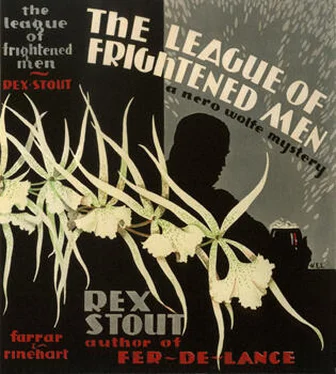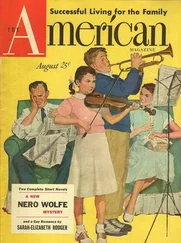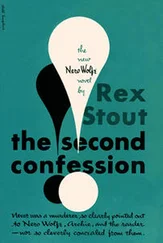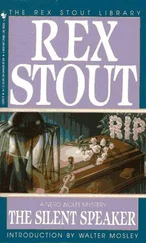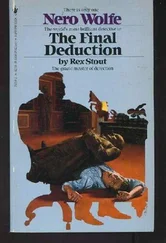“I can’t. It’s locked.”
“Well.”
I went to the safe and got a couple of my bunches of keys, and went back and started trying. The lock was nothing remarkable; in a few minutes I had it. I laid the keys down and lifted the lid. Orrie stood up and looked in with me. We didn’t say anything for a second, then we looked at each other. I never saw him look so disgusted.
Wolfe said, “Empty?”
“No, sir. We’ll have to give Orrie a drink. It’s not his, it’s hers. I mean Dora Chapin’s. It’s her hand-and-foot box. Gloves and stockings and maybe other dainties.”
“Indeed.” To my surprise Wolfe showed interest. His lips pushed out and in. He was even going to get up. He did so, and I shoved the box across.
“Indeed. I suspect — yes, it must be. Archie. Kindly remove them and spread them on the desk. Here, I’ll help. No, Orrie, not unless you wash your hands first.—Ha, more intimate still! But mostly stockings and gloves.—Less roughly, Archie, out of respect for the dignity the race aspires to; what we are displaying on this desk-top is the soul of a man. Qualities may be deduced — for instance, do you notice that the gloves, varying as they do in color and material, are all of a size? Among twenty pairs or more, not one exception? Could you ask more of loyalty and fidelity? O, that I were a glove upon that hand ... But with Romeo it was only rhetoric; for Paul Chapin the glove is the true treasure, with no hope beyond either of sweet or of bitter.—Again, let us not be carried away; it is a distortion to regard this or that aspect of a phenomenon to the exclusion of others. In the present case, for example, we cannot afford to forget that these articles are of expensive materials and workmanship, that they must have cost Dr. Burton something around three hundred dollars and that he therefore had a right to expect that they should get more wear. Some of them, indeed, are practically new. To strike a balance—”
Orrie was sitting down again staring at him. It was I who cut him off: “Where does Burton come in? I’m asking that in English.”
Wolfe fingered the gloves some more, and held up a stocking to look through it at the light. To see him handling female hosiery as if he understood it gave me a new insight into the extent of his pretensions. He held up another one, dropped it back gently to the table, and took a handkerchief from his pocket and wiped his hands, carefully, fingers and palms. Then he sat down.
“Read your Anglo-Saxon poets, Archie. Romeo himself was English, in spite of geography. I am not trying to befuddle you, I am adhering to a tradition.”
“All right. Where does Burton come in?”
“I have said, he paid the bills. He paid for these articles, his wife wore them, Dora Ritter, later Chapin, appropriated them, and Paul Chapin treasured them.”
“How do you know all that?”
“How could I help but know it? Here are these worn things, kept by Paul Chapin in an elegant and locked receptacle, and in a time of crisis removed by him to a place of safety against unfriendly curiosity. You saw the size of Dora Chapin’s hands, you see these gloves; they are not hers. You heard Monday evening the story of Chapin’s infatuation with the woman who is now Dr. Burton’s wife. You know that for years Dora Chapin, then Ritter, was Mrs. Burton’s personal maid, and that she still attends her, to do something to her hair, at least once a week. Knowing these things, it would seem to me that only the most desperate stupidity—”
“Yes, sir. Okay on the stupidity. But why does it have to be that Dora took them? Maybe Chapin took them himself.”
“He might. But most unlikely. Surely he did not strip the stockings from her legs, and I doubt if he was familiar with her dressing-room. The faithful Dora—”
“Faithful to who? Mrs. Burton, swiping her duds?”
“But, Archie. Having seen Dora, can you not grant her rarity? Anyone can be faithful to an employer; millions are, daily, constantly; it is one of the dullest and most vulgar of loyalties. We need not, even if we could, conjecture as to the first stirring of sympathy in Dora’s breast on her perceiving the bitter torment in the romantic cripple’s heart. I would like to believe it was a decent and honorable bargain, that Paul Chapin offered to pay her money, and did pay her, to get him a pair of gloves his unattainable beloved had worn, but I fear not. Having seen Dora, I suspect that it was the service of romance to which she dedicated herself; and that has been her faithfulness. It may even account for her continuing to visit Mrs. Burton when her marriage freed her from the practical necessity; doubtless, fresh specimens are added from time to time. What a stroke of luck for Chapin! The beloved odor, the intimate textile from the skin of his adored, is delivered to him as it may be required; more, the fingers which an hour ago played in his lady’s hair are now passing him his dinner coffee. He enjoys, daily, all the more delicate associations with the person of his passion, and escapes entirely the enforced and common-place contacts which usually render the delights of dubious profit. So much for the advantage, the peculiar thirst called emotional, of the individual; it is true that the race of man cannot be continued without it. But the biological problem is another matter.”
Orrie Cather said, “I knew a guy in the army that used to take out a girl’s handkerchief and kiss it before he went to sleep. One day a couple of us sneaked it out of his shirt and put something on it, and you should have heard him when he stuck his snout against it that night. He burned it up. Later he laid and cried, he was like that.”
I said, “It took brains to think up one as good as that.” Wolfe looked at Orrie, shut his eyes for a few seconds, and opened them again. He said:
“There are no ubiquitous handkerchiefs in this collection. Mr. Chapin is an epicure.—Archie. Repack the box, with feeling, lock it, wrap it up, and find a place for it in the cabinet.—Orrie, you may resume; you know your instructions. You have not brought us the solution of our case, but you have lifted the curtain to another room of the edifice we are exploring. Telephone at five after six as usual.”
Orrie went down the hall whistling.
I had a nice piece of leather of my own, not as big as Paul Chapin’s treasure box, but fancier. Sitting at my desk around five o’clock that Wednesday afternoon, killing time waiting for a visitor who had phoned, I took it out of my inside breast pocket and looked at it; I had only had it a couple of weeks. It was brown, ostrich-skin, and was tooled in gold all over the outside. On one side the tooling was fine lines about half an inch apart, with flowers stemming out from them; the flowers were orchids; the workmanship was so good that you could tell Wolfe had given the guy a Cattleya to work from. The other side was covered with Colt automatics, fifty-two perfect little gold pistols all aiming at the center. Inside was stamped in gold: A. G. from N. W. Wolfe had given it to me on October 23rd, at the dinner-table, and I didn’t even know he knew when my birthday was. I carried my police and fire cards in it, and my operator’s license. I might have traded it for New York City if you had thrown in a couple of good suburbs.
When Fritz came and said Inspector Cramer was there I put it back in my pocket.
I let Cramer get eased into a chair and then I went upstairs to the plant-rooms. Wolfe was at the potting-bench with Horstmann, spreading out some osmundine and leaning over to smell it; a dozen or so pots of Odontoglossums, overgrown, were at his elbow. I waited until he looked around, and I felt my throat drying up.
“Well?”
Читать дальше
